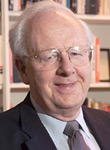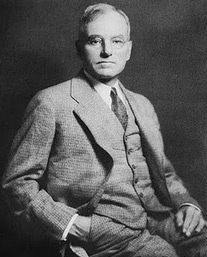One role of a professor is to 'think otherwise,' says LaFeber
By Jenny Proctor

Professor Emeritus Walter LaFeber, speaking at Carl Becker House Oct. 13, recalled his reaction to something that Becker, one of Cornell's most famous and widely read historians, once wrote: "'A professor is somebody who thinks otherwise,'" said LaFeber. "I thought that was really profound."
But Becker did not always endeavor to "think otherwise," said LaFeber, himself a renowned Cornell history professor, speaking to students in the new one-credit course "Reading Carl Becker," co-taught by Cindy Hazan, Becker House dean and associate professor of human development, and Michael Kammen, the Newton C. Farr Professor Emeritus of American History and Culture.
In Becker's 1917 essay "On Being a Professor," LaFeber said Becker argued that a professor's work "is not to be dictated by contemporary politics." The essay criticized the idea of the "new professor," who cared more about stressing efficiency than thinking otherwise about the larger society.
But in a 1931 work Becker suggested, LaFeber explained, that "the obligation of the intellectual is to listen to 'Everyman' because 'Everyman' essentially defines the society in which the intellectual works." This contradicts Becker's earlier idea that a professor should not be obligated to align his opinions with society's. LaFeber said that this disparity was the result of Becker's experiences in World War I.

In 1917, Becker was part of the Creel Commission, which produced government propaganda to influence U.S. public opinion on America's participation in World War I. Becker firmly supported Woodrow Wilson and believed America should become involved in the war, LaFeber said. "But by 1919, Becker had become disillusioned with Wilson and the results of the war."
This disillusionment, LaFeber said, caused Becker to change his ideas about a professor's relationship with society. Until at least the mid-1930s, Becker lacked the pro-war zeal he had had for the previous war and wrote that the Fascist threats should be handled with rational diplomacy, not force.
LaFeber, who approved of Becker's statement about professors "thinking otherwise," was less impressed by Becker's failure to take a stand in the 1930s.
"With Becker, we're not talking about ordinary academia," he said. "We're talking about somebody who had a national audience, who had tremendous respect, who had access to leading periodicals, and he still didn't take a position."
According to LaFeber, professors in Becker's situation have a responsibility to take a position on issues. Students should not go to a university only to hear "Everyman's" opinions.
"One of the things that should happen here is that you're opened up to these other perspectives," LaFeber said. "And you should be challenged. It doesn't mean you change. What it should be is that if you're right, your reasoning should be reinforced."
When asked to relate Becker's views to the 1969 student takeover of Willard Straight Hall, LaFeber said it is an example of a time when professors had to take a strong position, regardless of what "Everyman" may have thought.
"You don't deal with it by being detached," he said, "and you don't come to terms with it by talking about what Mr. Everyman would do."
But LaFeber continues to support Becker's earlier statement that a professor is someone who thinks otherwise. "That's one of the purposes of Cornell," he said, "to throw out these kind of challenges to people, take positions and argue about them."
The course Reading Carl Becker is held every Wednesday at 7 p.m. in Hazan's apartment, G50 Carl Becker House. Although it may be taken for credit, the meetings are open to all.
According to the course description for Reading Carl Becker, "Becker (1873-1945) remains Cornell's most famous and widely read historian. That is why a West Campus house is named in his honor. He was wise, witty and plain-spoken -- an unassuming man who was a brilliant writer, readily noticed in journals of opinion as well as within academe. In his day he was the very model of a public intellectual, considered too liberal by some and too conservative by others.
"Becker ranks among the most widely read historians and critics in the twentieth century. His voice mattered in public discourse. He became the official historian of Cornell and wrote 'Cornell University: Founders and the Founding' (1943) as well as 'Freedom and Responsibility in the American Way of Life' (1945), both classics still in print."
In addition to "On Being a Professor," the course also focuses on Becker's essays "Letters on Education," "The Art of Writing," "Detachment and the Writing of History" and "What Are Historical Facts?"
Jenny Proctor '12 is a writer intern for the Cornell Chronicle.
Media Contact
Get Cornell news delivered right to your inbox.
Subscribe